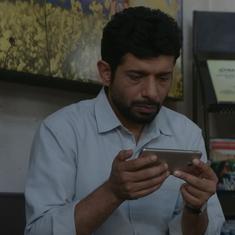Psyche Running by German poet Durs Grünbein, translated by Karen Leeder, and published by Kolkata’s Seagull Books, won the 2025 Griffin Poetry Prize.
The judges said, “Durs Grünbein’s Psyche Running is a brilliant overview and selection of a poet who satisfies our hunger to be serious, as again and again he finds himself ‘between words and things.’ Karen Leeder’s adept translations establish a new version of Grünbein in English: universal, lyrical, philosophical.”
Here are five poems from the collection:
Configured Night
Or poetry, what was that again? Seduction
by ancient feelings …. Voice-catcher, syllable-
magic, ars minor of the most elaborate finesse.
The chill of self-encounter, a dance
between all the stools. Not something half then,
nor something whole, yet marked by
that certain whiff of excess. For some a godless
prayer, for others the “true absolute real”.
That zigzag cicatrice – reason, bound up
with myth and affect – fresh scars,
marking the sleeping body
with sensitive spots.
The echoes return to the source, to the mouth,
where sounds are rounded to shape. Breath-image,
exhaled into the frosty air, into the dew-fresh nihil.
Led by a magic harness, Ariadne’s thread,
through the darkness of aporias, a chain
of happy moments stretching back
to the bathing girls by the Nile.
Most intimate line, one that cannot be plotted;
and has thus been escaping all geometry
since the world has been thought translatable
into formulae, into natural laws.
Forget this shameless I and its You,
longed into presence from afar. Verse
is a diver, scouring the depths,
searching for treasure on the seabed,
out there in the brain. It conspires
with burnt-out stars.
Metaphors are those flat stones
that someone throws from the shore, out
towards open sea. That skip across,
skimming the surface: three, four, five,
six times, if you’re lucky, before they sink
through the surface like a leaden plumb. Rifts,
that echo through time. Philosophy
in meter, the joyful music in leaping
from word to thing (and back).
Gifted, some say, while others insist:
the product of insight. What remains
are the poems, the songs
that mortality sings.
A travel guide, the very best, in the exodus
out of humanity’s night.
Childhood in the Diorama
Strange, as a child he was always drawn to the inert.
In museums he’d stand for ages at the diorama,
its animals ranged in natural groups, stock-still
against the painted backdrops, forests, Himalayas.
Enchanted, as in a fairy tale, the deer pricked up
its ears as he edged closer in the neon, eyes shining.
In the skull of the caveman right next door he saw
only the gaping hole, couldn’t imagine the blow
of his rival’s club, the struggle for the fire.
The Egyptian mummy had lasted thousands of years
with its brain spooled out. Only with the melting
of the perma-ice had this mammoth come to light.
The most beautiful butterflies, big as your hand,
he found skewered with pins. Once he thought
he saw their wings still quivering – as if in memory
of the trees that had been felled, the tropical winds.
A draught, perhaps, had blown through the displays.

Echo Will Now Speak a Word or Two
What then, foolish dauber, you want to draw my face,
vex a goddess who is ignorant of sight?
Daughter of the air, of the tongue, I am. Mother of
empty signs, nothing but a voice without a mind.
Grasping the dying fall, the ends of others’ words,
to give them back to you in mimicry as mine.
Inside your ears I dwell, resound through all, Echo!
If you would paint my likeness, paint the sound.
Island without Sirens
for Alexander Kluge
And suddenly you saw it, far below
the coast road, after the twelfth curve,
stomach surging from the hair-pin drive.
En route for the south; so we sped on
perched above the drop, windows down.
Sorrento with its villas, its fan palms,
had been swallowed by the plug-hole
of the mirror in a great green swirl.
It hung in the haze, a hulk of bare rock.
The sea, dead still. Not a trace of myth,
but for the yachts decked out in chrome
glinting in the sunlight. On a white hull
we made out “Nausicaa” in faded letters.
How the rumour started, I don’t know –
but someone said this was it, so we parked up
in the middle of nowhere, on the open road.
High above, an orange grove aflame,
and below us, out in the blue, the island.
It was disappointingly bare. In the scree
of limestone baked hard by the sun
not even a twig left for the cormorants.
And the silence stretched for miles,
making one think of test-sites, dead craters,
the acoustics of bombed-out opera houses.
Those fat spectral birds with the long necks,
the singer in the grand finale with his top C,
they had all flown – and what remained
was moon rock absorbing every echo.
From a Book of Weaknesses
Gigantic agenda, this life of ours –
that turned out so different, then after all the same.
We picture ourselves when we close our eyes
in a lift that’s counting the years in floors.
Often one of us gets out mid-way, walks along the corridor,
towards himself, his own doppelganger.
The half of it is stumbling, knocking on the wrong door,
the one with the painted-on heart. And then –
this collapsing with fatigue, the relief.
Day after day another petal falls
from the crazy bouquet that only yesterday
almost made the vase explode with its splendour.
Blue hydrangea, wood anemone, black tulip –
Sounds like some kind of improvisation:
exercises for a toy piano – unbound lines of verse.
And this unboundness means we’re dying
imperceptibly, and suddenly we are glad
to live as if we were immortal,
while writing stems the flow, and
every single word is crucial. So now begin:
Write a book of your daily weaknesses.
On Learning Old Vocabulary
Words don’t sleep in dictionaries. They kick about
aimlessly on street corners, play with munitions,
like kids that carry war inside even when it’s done.
We never would’ve guessed Herr Nobel, that dynamite,
might make them interchangeable: material, morality, modern art.
Particles that went flying from that day, articles
in all the scientific journals, thousands per subject –
A desert track of knowledge. And the great gulf
between this and that meaning of “Devotion”,
the satellite pictures of “Delirium” or “Democracy”.
Who did this, who destroyed it all? The baby face,
that breathed in smog and blew it out as a cloud of gold dust.
It’s down to him, who sold the dawn for scrap.
Don’t stop the dictation, you poets. Words don’t sleep.

Excerpted with permission from Psyche Running: Selected Poems, 2005–2022, Durs Grünbein, translated from the German by Karen Leeder, Seagull Books.










